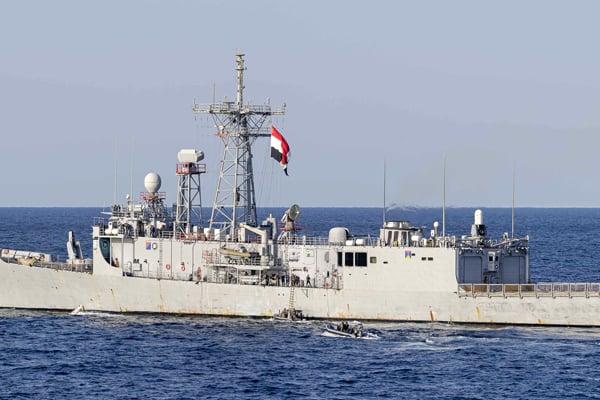Prime
Egypt, Sudan conduct joint military drills as tensions boil over Ethiopian dam

Dubbed "SUD-EGY-T-1" the training, which lasted for several days was conducted at the naval base of Port Sudan on the Red Sea, the Egyptian army announced in a statement.
What you need to know:
- The two downstream countries insist Ethiopia should halt water filling operations until the parties reach a legally binding agreement with Ethiopia on the overall operation of the dam.
Egyptian and Sudanese naval forces conducted a multi-day joint military exercise as tensions mount over Ethiopia's massive dam project being built on the Blue Nile River.
Dubbed "SUD-EGY-T-1" the training, which lasted for several days was conducted at the naval base of Port Sudan on the Red Sea, the Egyptian army announced in a statement.
The Egyptian announcement comes only days after Ethiopia revealed that the construction of the controversial mega-dam, Grand Ethiopian Renaissance Dam (GERD) had reached 90 percent completion.
It also comes as Ethiopia prepares to fill the dam for the fourth time disregard to Egyptian fresh warnings.
Late last month, Egypt issued a new warning against Ethiopia over the multi-billion-dollar dam project which would be Africa's largest upon completion.
Cairo said "all options are on the table" to deal with any threats to its water supply posed by the Ethiopian mega dam.
"All options are open, and all alternatives remain available, and Egypt has its capabilities, its foreign relations, and its capabilities," Egyptian Foreign Minister Sameh Shoukry warned.
A day later, Addis Ababa responded angrily, dismissing as "irresponsible" the remarks by the Egyptian foreign minister.
"Such a threat constitutes a flagrant breach of the United Nations Charter and Constitutive Act of the African Union," Ethiopia's Ministry of Foreign Affairs said.
"This also stands as a clear violation of the Agreement on the Declaration of Principles on the Grand Ethiopian Renaissance Dam signed on 23 March 2015 between Ethiopia, Egypt and Sudan. Egypt must stop its callous and unlawful pronouncements," the Ethiopian statement then added.
Ethiopia further called upon all concerned actors to take note of what it described as Egypt's flagrant violation of principles of international relations, underscoring that no interest can be advanced through threats and intimidation.
As Ethiopia and Egypt locked horns in a fresh row over the Nile dam, there are growing fears of military escalation in light of the deadlocked talks.
The Egyptian army said the latest military exercise aims to enhance combat preparedness and boost joint military cooperation between the two countries.
It focused on enhancing joint efforts to combat illegal marine activities in the Red Sea and to counter security threats posed by common enemy.
"The training included lectures and workshops on maritime security, illegal immigration, counter-terrorism, and atypical threats" it added.
"The training falls within the framework of the joint training plan of the armed forces with friendly countries to boost partnerships and military cooperation in various fields" the Egyptian army said.
The joint military drills is seen as the latest sign of deepening military ties between the two Arab countries.
Neighbors Egypt and Sudan, which share the Red Sea in northeastern Africa, have years of military cooperation and friendship.
Egypt and Sudan have previously made several agreements to strengthen their military cooperation especially after the dispute over the Ethiopian dam which is being built near the Sudanese border.
After Ethiopia started filling the dam in July 2020, Sudan and Egypt started to conduct several military exercises in Sudan.
In March 2021, the Egyptian and Sudanese armies reportedly signed a military cooperation agreement covering training and border security.
Cairo and Khartoum fear that the huge dam being built near the Sudanese border would eventually diminish their historic water shares from the River Nile, hence consider the Ethiopian dam as a threat to their water security.
The two downstream countries insist Ethiopia should halt water filling operations until the parties reach a legally binding agreement with Ethiopia on the overall operation of the dam.
Addis Ababa, however, argues that the dam will not have a significant impact on the natural water flow into the downstream countries.
Ethiopia, Sudan and Egypt has been engaged in negotiations for more than a decade to settle the dispute over Nile water resources but the parties could not reach into a final deal.



